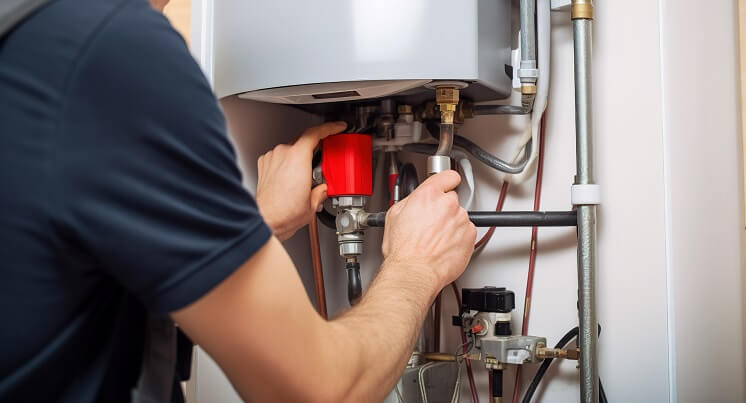Troubleshooting Standard Water Heater Malfunctions
Troubleshooting Standard Water Heater Malfunctions
Blog Article
Just how do you actually feel about Common Problems with Your Home Water Heater?

Visualize starting your day without your regular warm shower. That already sets a bad tone for the rest of your day.
Every home needs a dependable water heater, yet only a few understand exactly how to handle one. One simple way to maintain your water heater in top form is to look for mistakes consistently and fix them as soon as they show up.
Remember to switch off your hot water heater prior to smelling around for faults. These are the water heater faults you are more than likely to come across.
Water also warm or too cool
Every water heater has a thermostat that identifies how hot the water gets. If the water coming into your residence is as well hot despite setting a convenient optimum temperature level, your thermostat might be malfunctioning.
On the other hand, too cold water may be because of a stopped working thermostat, a broken circuit, or inappropriate gas circulation. For instance, if you make use of a gas hot water heater with a busted pilot light, you would obtain cold water, even if the thermostat remains in best condition. For electrical heating units, a blown fuse might be the offender.
Inadequate warm water
Water heaters can be found in several sizes, depending on your hot water demands. If you run out of hot water prior to everybody has actually had a bathroom, your water heater is as well little for your family size. You need to think about installing a larger hot water heater container or opting for a tankless water heater, which takes up less room and is much more durable.
Odd sounds
There go to least five kinds of noises you can hear from a water heater, however the most common analysis is that it's time for the water heater to retire.
First of all, you should recognize with the typical seems a hot water heater makes. An electric heating system might appear different from a gas-powered one.
Popping or banging sounds normally indicate there is a slab of debris in your storage tanks, as well as it's time to cleanse it out. On the other hand, whistling or hissing audios may merely be your valves letting some stress off.
Water leakages
Leakages can originate from pipes, water connections, shutoffs, or in the worst-case circumstance, the storage tank itself. Over time, water will certainly wear away the container, and also locate its way out. If this happens, you require to change your water heater immediately.
However, before your change your entire container, be sure that all pipelines are in place and that each shutoff functions completely. If you still need aid recognizing a leakage, call your plumber.
Rust-colored water
Rust-colored water indicates one of your hot water heater components is rusted. Maybe the anode rod, or the storage tank itself. Your plumber will certainly be able to determine which it is.
Lukewarm water
Despite exactly how high you established the thermostat, you will not obtain any kind of hot water out of a heating unit well past its prime. A hot water heater's performance might lower with time.
You will certainly additionally get warm water if your pipelines have a cross link. This means that when you switch on a tap, warm water from the heating system moves in along with normal, cold water. A cross connection is easy to spot. If your warm water faucets still run after shutting the water heater valves, you have a cross connection.
Discoloured Water
Rust is a major source of unclean or discoloured water. Rust within the water tank or a stopping working anode rod might cause this discolouration. The anode rod shields the tank from rusting on the inside as well as must be examined annual. Without a pole or a correctly working anode pole, the hot water quickly rusts inside the container. Get in touch with a professional water heater professional to determine if replacing the anode pole will certainly fix the trouble; if not, replace your hot water heater.
Conclusion
Preferably, your hot water heater can last one decade prior to you need a modification. Nonetheless, after the 10-year mark, you might experience any one of these faults a lot more regularly. At this point, you should add a brand-new water heater to your budget.
How To Troubleshoot 3 Common Water Heater Problems in Twin Cities
The Water Heater Is Leaking
A leaky cold water inlet valve A loose pipe fitting A leaky temperature and pressure relief valve A corroded anode rod A cracked tank Turn Off Your Water Heater:
Shut off your gas water heater by turning the gas valve on the unit to the “OFF” position. Shut off your electric water by switching its power off at your electrical panel. Look for a two-pole breaker labeled “water heater” and turn it to the “OFF” position. Move the ball valve connected to the water heater to be perpendicular to the piping at a 90° angle. Look for the Leak:
Depending on whether the water is coming from the tank's top or bottom, you’ll want to look for the leak in different locations.
If the leak comes from the top of the tank, carefully look for water escaping from the cold water inlet valve or loose pipe fittings. Rusted hot and cold water valves can have loose connections with the tank, with water leaking out of them.
https://mspplumbingheatingair.com/blog/how-to-troubleshoot-3-common-water-heater-problems
As an avid person who reads on Water Heaters Problems, I thought sharing that section was worthwhile. Appreciated our blog posting? Please share it. Help someone else discover it. Many thanks for your time invested reading it.
Address plumbing needs. Report this page